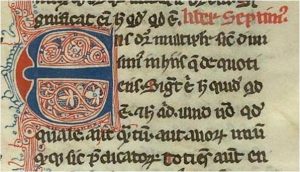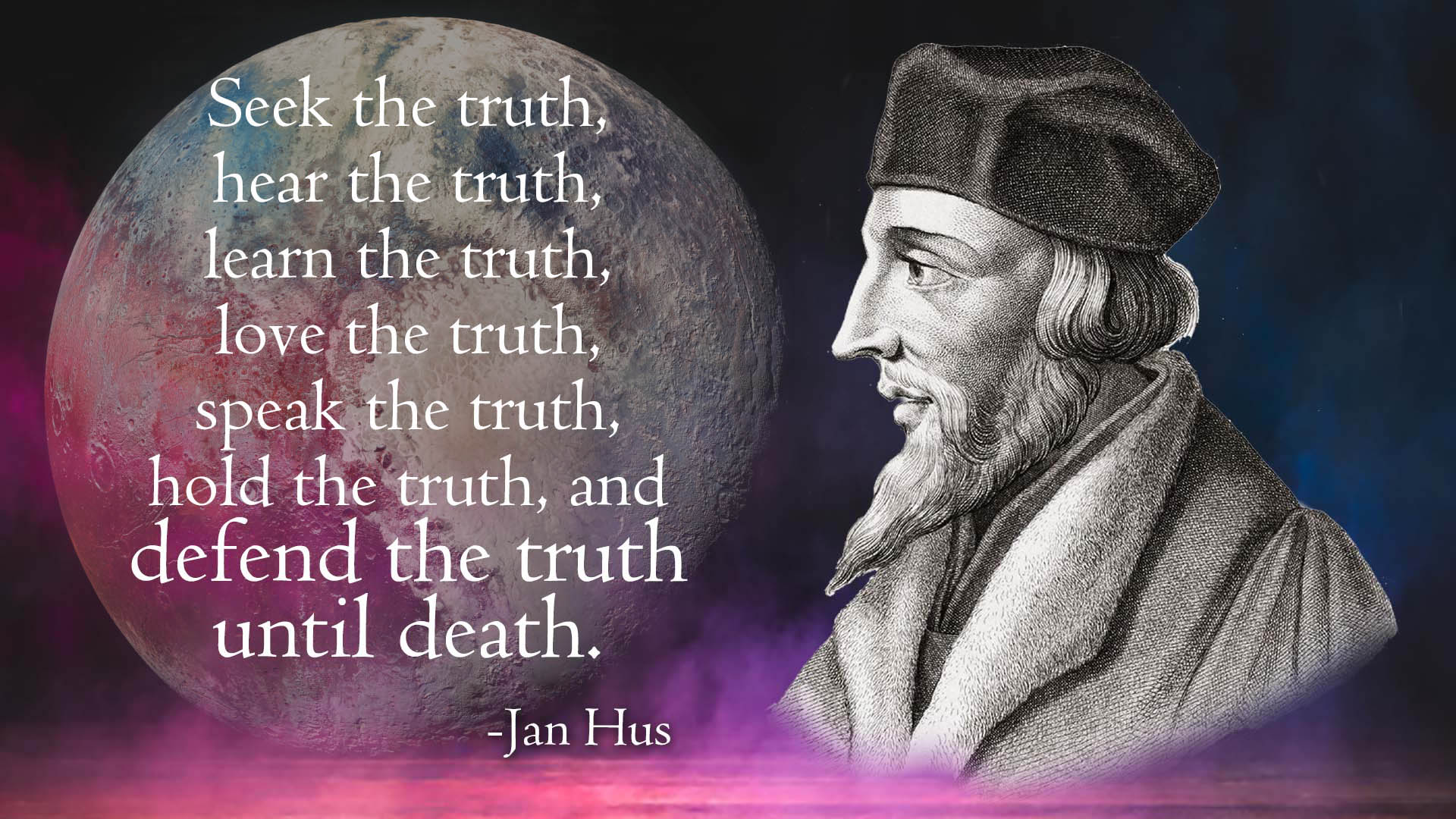by the Rev. John Jackman
We remember Jan Hus for a few things — preaching in the common language, his courage, his martyrdom. But at the crucial center of his life was a profound dedication to truth.
Hus wasn’t just a priest – he was also a philosopher, a thinker. Most people forget that he was appointed dean of the philosophy faculty at the Charles University in Prague before he was called to preach at the Bethlehem Chapel. He was well versed in Plato and Aristotle. Reading his sermons, his writings, we catch a sharp and intensely logical mind behind the preaching.

Pravda Vitězi, “Truth Prevails”
We often hear that Hus’ motto was “Veritas Vincit,” which can be translated “Truth Prevails,” “Truth is Victorious,” or perhaps “Truth Wins Out in the End!” This motto has come down through the centuries and is today emblazoned on the flag of the Czech president — in Czech, of course! “Pravda vítězí” is also engraved on the base of the Jan Hus Memorial in Prague.
But what he actually wrote is a little more extensive:
- Seek the truth,
- Hear the truth,
- Learn the truth,
- Love the truth,
- Speak the truth,
- Hold the truth, and
- Defend the truth until death
Truth was central to Hus’ thought — and for him, there was a crucial and terrifically important distinction between human perception of truth and The Truth. Hus was familiar with Aristotle’s Metaphysics, with Thomas Aquinas’ restatement of the correspondence theory, “A judgment is said to be true when it conforms to the external reality.” He viewed truth as something external to ourselves, something absolute and immutable, but something which we perceive imperfectly. Hus says, “I am convinced that what we know is a whole lot less than what we do not know.” For Hus, that “Capital T” truth is God’s truth, and it is most faithfully expressed on a human level in the person of Christ. And we must test our perceptions against the reality, not simply accept our judgments as being somehow “true.”

Aristotle’s Metaphysics, as Hus might have read it.
It may seem obvious to the thoughtful person that our perceptions of truth are not the same thing as truth itself — but in fact it is patently not obvious to most people in history. As children we learn through our senses, we define “reality” as the sensation we have of taste, of touch, of smell. It is normal to think of our experience of reality as being reality, and in consequence most people also confuse their opinions with truth. Physicists can talk of electrons and quarks and strings all they want, that brick wall over there still seems pretty much like a solid impervious bit of reality to me! And in the same way, in a world of spin doctors and manipulated news and echo tank politics, most folks utterly and completely confuse their opinions with absolute truth. Never have we lived in a time where so many “truths” float about without any firm connection to reality. Viewers of TV news and fans of talk radio hear an entirely different set of “facts” than do other people. This reality is utterly self-referencing without any test of reality.
For Hus, there must always be a test against reality. In his day, this included reference to the actual Scriptures (instead of just second and third hand versions through clergy), the writings of Church Fathers, and the entire expanse of Church tradition (instead of just the latest memo from Rome or Avignon or wherever). But what is more, he clearly looks for logic, reason, and even the actual experience of believers – anticipating by several centuries the “Wesley Quadrilateral.”
Hus possesses a rare thing: while being absolutely convinced of his opinion, he still has humility about his own limitations, and is always open to a better explanation. “I’ve made it a principle in my studies that whenever I encounter a more sound opinion, whenever I encounter something that is clearly superior in argument, I am prepared to give up the previous position and adopt the more advanced one.” In every encounter with authority, he made his position clear, and then said “If I am wrong, instruct me! Show me in the Scriptures, in the Church Fathers!” The councils and bishops, of course, were not interested in engaging with Hus on any of these details — they were interested in exerting their authority.
In the past few years I have found a marvelous illustration of Hus’ distinction between truth and human perceptions of truth. In 2006, the International Astronomical Union redefined what would be considered a “planet” — and poor little Pluto was demoted to being a “dwarf planet.” Interestingly enough, that same year the New Horizons probe was launched specifically to fly by Pluto and send back photos and readings. At an initial velocity of 9,000 MPH, bumped to an incredible 53,000 MPH after a slingshot maneuver around Jupiter, it took New Horizons nine years to reach the very distant and tiny dwarf planet. Astonishing pictures were beamed back, and new data received which has revealed far more about Pluto than we knew before. It is, in fact, larger than we previously thought — though not enough to meet the new definition of a planet by clearing other debris in its orbit.

Photograph of Pluto from New Horizons spacecraft.
So here’s the point: did the deliberations of the IAU make any difference to the reality of that is Pluto? Pluto existed before it was discovered in 1915. The orbital entity (whatever we label it) didn’t change a bit in 2006 when the IAU “deplanetized” it. Its reality and trajectory didn’t change a smidgeon as New Horizons flew by and took photos. I believe that Jan Hus viewed the rulings of Councils in exactly the same light as we would objectively view the deliberation of the IAU: human deliberations about truth are not at all the same thing as the truth.
Hus’ approach is in fact remarkably a precursor of scientific method. Dr. Thomas Fudge says “But Hus did not blindly follow Wycliffe or anyone else. If you look at Hus’ use of Wycliffe, you will find a discriminating, judicious handling and interpretation. So he wasn’t going to follow the Church blindly, he wasn’t going to follow Wycliffe blindly, even though he admired Wycliffe. So I would say that we find in him the rudimentary seeds of critical thinking where he wanted evidence before he would change his mind or retreat from principle. And I think that it’s not too much to say that this is part of the forerunner stage of the scientific method.”
A long time ago I gave my daughter a bumper sticker that said, “Don’t Believe Everything You Think!” Sadly, too many people in our world today are willing to sacrifice everything on the altar of their own opinions, without any reality check at all. Hus was the opposite — ready to sacrifice himself for the truth. He was clear on what came first: “Truth is more important than life. It is better to die well than to live badly.”
How I wish that Synods, that Councils, that Courts, that politicians and talk show bloviators could catch just a bit of Hus’ humility and dedication to the Truth. Our world would be a different place and our children’s future would be altogether changed.

Don’t Believe Everything You Think! – Bumper Sticker
The Rev. John Jackman is the Executive Director of Comenius Foundation and an award-winning filmmaker. He has a degree in Philosophy as well as one in Divinity. In addition to making movies, he serves as pastor of Trinity Moravian Church in Winston-Salem, NC.






